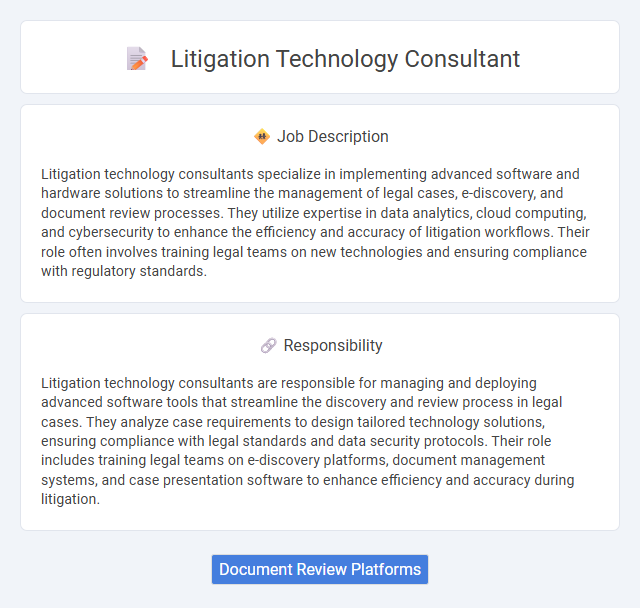
Litigation technology consultants specialize in implementing advanced software and hardware solutions to streamline the management of legal cases, e-discovery, and document review processes. They utilize expertise in data analytics, cloud computing, and cybersecurity to enhance the efficiency and accuracy of litigation workflows. Their role often involves training legal teams on new technologies and ensuring compliance with regulatory standards.
Individuals with strong analytical skills and a keen interest in both law and technology are likely to thrive as litigation technology consultants. Those comfortable working in fast-paced environments and adapting to constantly evolving software tools may find this role particularly suitable. People who prefer structured problem-solving and collaborating with legal teams could have a higher probability of success in this career.
Qualification
Legal expertise combined with advanced proficiency in litigation software, e-discovery tools, and data management systems is crucial for a Litigation Technology Consultant. Strong analytical skills paired with a background in law, computer science, or information technology enable effective case strategy support and technical troubleshooting. Certifications such as Certified E-Discovery Specialist (CEDS) or Certified Legal Technology Specialist (CLTS) enhance credibility and demonstrate specialized knowledge.
Responsibility
Litigation technology consultants are responsible for managing and deploying advanced software tools that streamline the discovery and review process in legal cases. They analyze case requirements to design tailored technology solutions, ensuring compliance with legal standards and data security protocols. Their role includes training legal teams on e-discovery platforms, document management systems, and case presentation software to enhance efficiency and accuracy during litigation.
Benefit
Litigation technology consultants likely improve case management efficiency by implementing specialized software and tools tailored to legal workflows. Their expertise probably enhances data organization and retrieval, reducing the time spent on discovery and document review. Clients may experience cost savings and increased accuracy in presenting digital evidence during litigation processes.
Challenge
Litigation technology consultants likely face the challenge of rapidly evolving legal tech tools, requiring constant adaptation and skill updating to stay effective. They probably encounter complex client demands for customized solutions, increasing the pressure to balance technical expertise with legal knowledge. Navigating intricate data security and compliance issues might also present significant obstacles in their role.
Career Advancement
A Litigation Technology Consultant leverages expertise in e-discovery tools, legal software, and data analysis to streamline case management and enhance trial preparation. Mastery of emerging technologies such as AI-driven document review and cloud-based collaboration platforms significantly boosts career advancement prospects. Professionals who continuously update their technical skills and obtain certifications in legal tech gain competitive advantages for leadership roles within law firms and corporate legal departments.
Key Terms
Document Review Platforms
Litigation technology consultants specialize in optimizing the use of document review platforms such as Relativity, Concordance, and Everlaw to streamline e-discovery processes. They implement advanced features like AI-driven analytics, predictive coding, and automated tagging to enhance accuracy and reduce review time. Expertise in configuring these platforms ensures efficient management of large volumes of legal documents during complex litigation cases.
 kuljobs.com
kuljobs.com